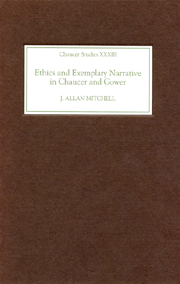Book contents
- Frontmatter
- Contents
- Acknowledgements
- Abbreviations
- Introduction
- 1 Reading for the Moral: Controversies and Trajectories
- 2 Rhetorical Reason: Cases, Conscience, and Circumstances
- 3 Gower For Example: Confessio Amantis and the Measure of the Case
- 4 All That Is Written For Our Doctrine: Proof, Remembrance, Conscience
- 5 Moral Chaucer: Ethics of Exemplarity in the Canterbury Tales
- 6 Pointing the Moral: The Friar, Summoner, and Pardoner's Satire
- 7 Griselda and the Question of Ethical Monstrosity
- Conclusion
- Bibliography
- Index
- CHAUCER STUDIES
5 - Moral Chaucer: Ethics of Exemplarity in the Canterbury Tales
Published online by Cambridge University Press: 12 September 2012
- Frontmatter
- Contents
- Acknowledgements
- Abbreviations
- Introduction
- 1 Reading for the Moral: Controversies and Trajectories
- 2 Rhetorical Reason: Cases, Conscience, and Circumstances
- 3 Gower For Example: Confessio Amantis and the Measure of the Case
- 4 All That Is Written For Our Doctrine: Proof, Remembrance, Conscience
- 5 Moral Chaucer: Ethics of Exemplarity in the Canterbury Tales
- 6 Pointing the Moral: The Friar, Summoner, and Pardoner's Satire
- 7 Griselda and the Question of Ethical Monstrosity
- Conclusion
- Bibliography
- Index
- CHAUCER STUDIES
Summary
Some may still find it customary or convenient to distinguish Chaucer on the basis of his good humor from the sententiousness of Gower, but the distinction overestimates the difference between their respective accomplishments. As Derek Brewer reminds us, Chaucer's early reception was as a poet who wrote “serious and nourishing subject-matter.” During Chaucer's own lifetime Eustache Deschamps eulogized him as Seneque en meurs, and observed that drinking from Chaucer's font had quenched ma soif ethique. Thomas Usk extolled Chaucer as “the noble philosophical poete / in Englissh,” and Henry Scogan took Chaucer to be a moral philosopher of “vertuous noblesse.” In the early fifteenth century, soon after Chaucer's passing, John Lydgate lauded the poet for “keping in substance / The sentence hool,” and Thomas Hoccleve considered him equal to “Tullius” [Cicero] and an “hier in philosophie / To Aristotle.” Later still Chaucer was acclaimed “ful of plesaunce / Clere in sentence,” and Caxton would also attribute to the poet “hye and quycke sentence,” not just as a part of a marketing campaign but because this is what Chaucer was by then regularly celebrated for. To be sure, encomia such as these typically pay tribute to Chaucer for his novelty, his eloquence, and the way “he hath toold of loveris up and doun,” but such high praise is characteristically premised on the assumption that Chaucer is morally serious.
- Type
- Chapter
- Information
- Ethics and Exemplary Narrative in Chaucer and Gower , pp. 79 - 93Publisher: Boydell & BrewerPrint publication year: 2004

